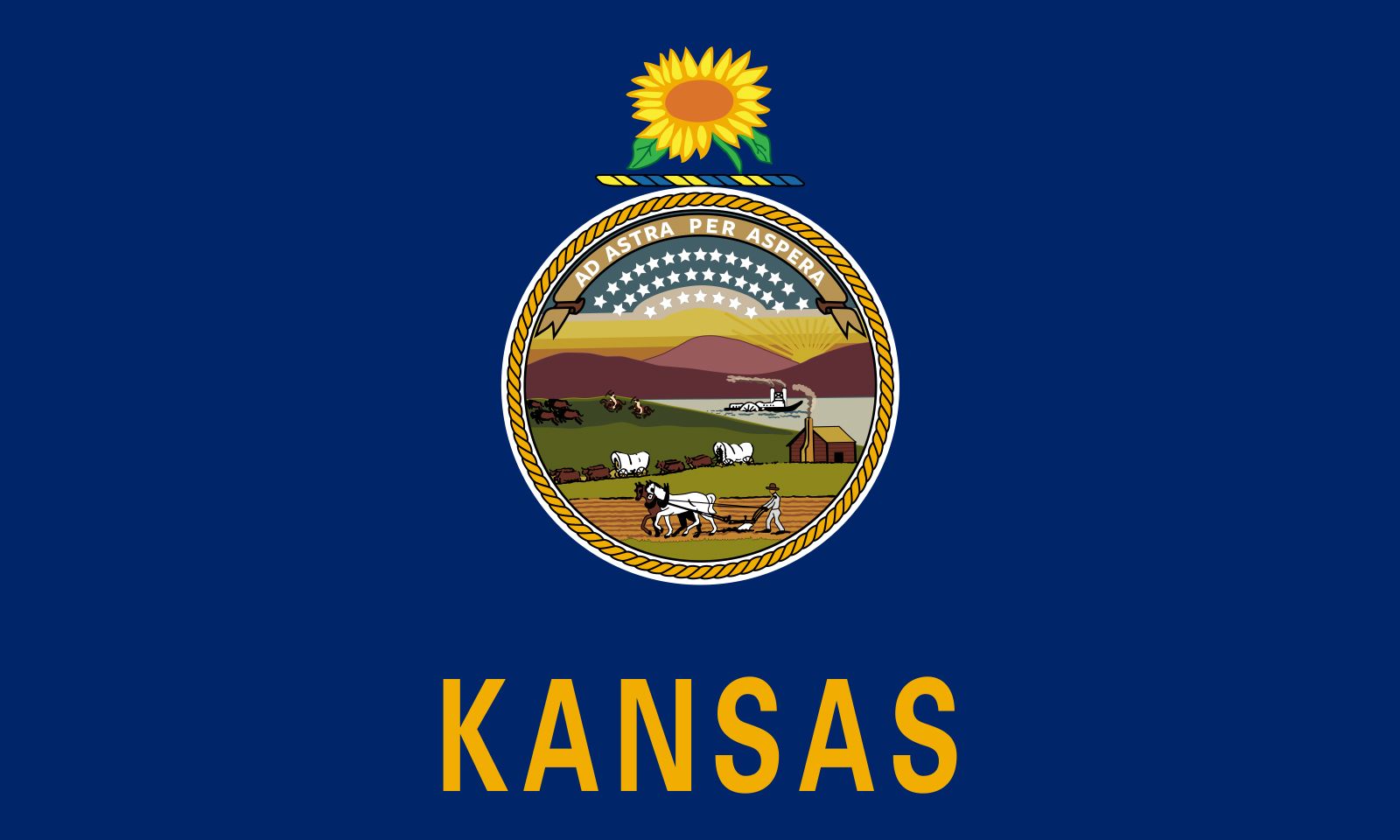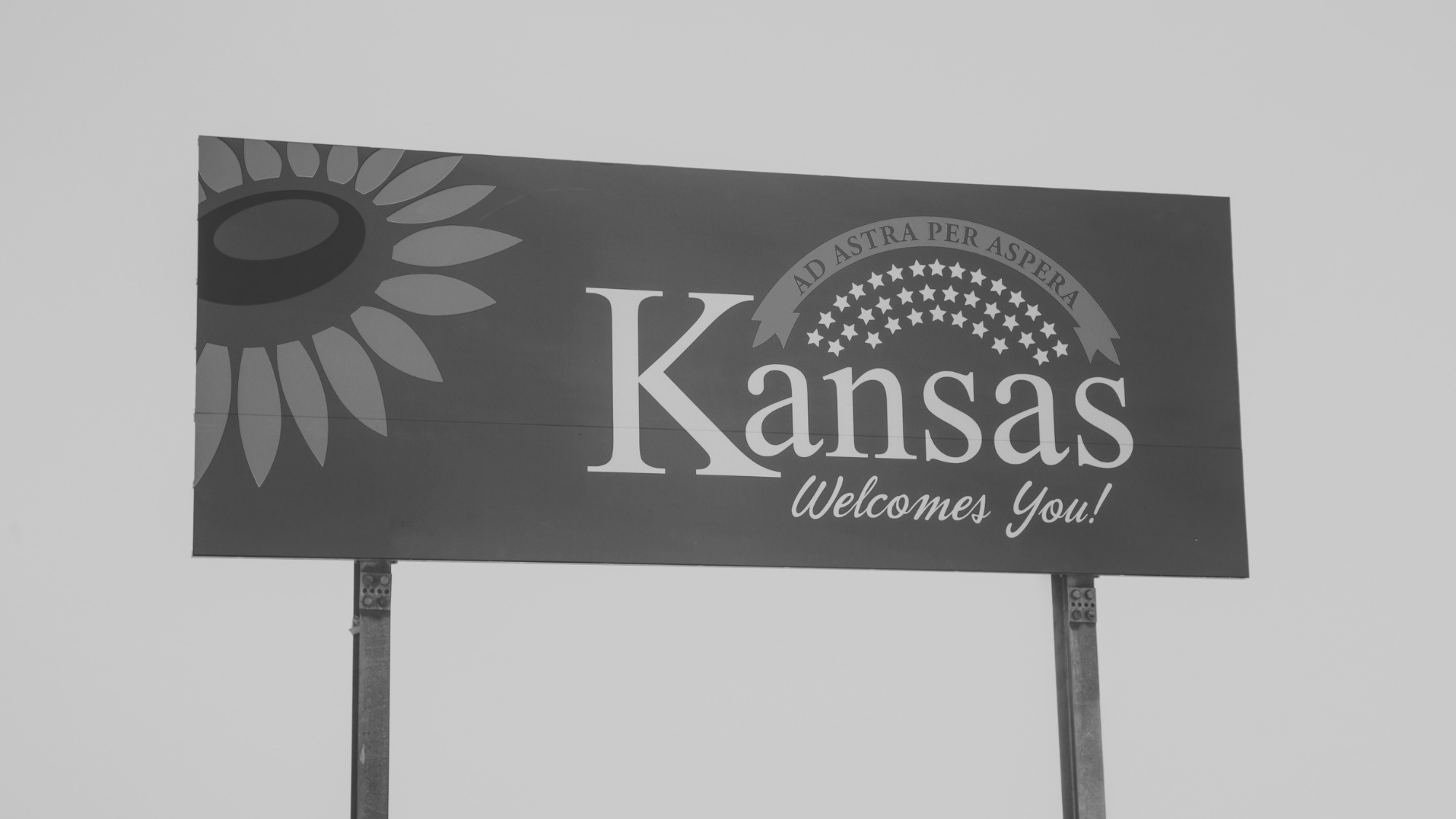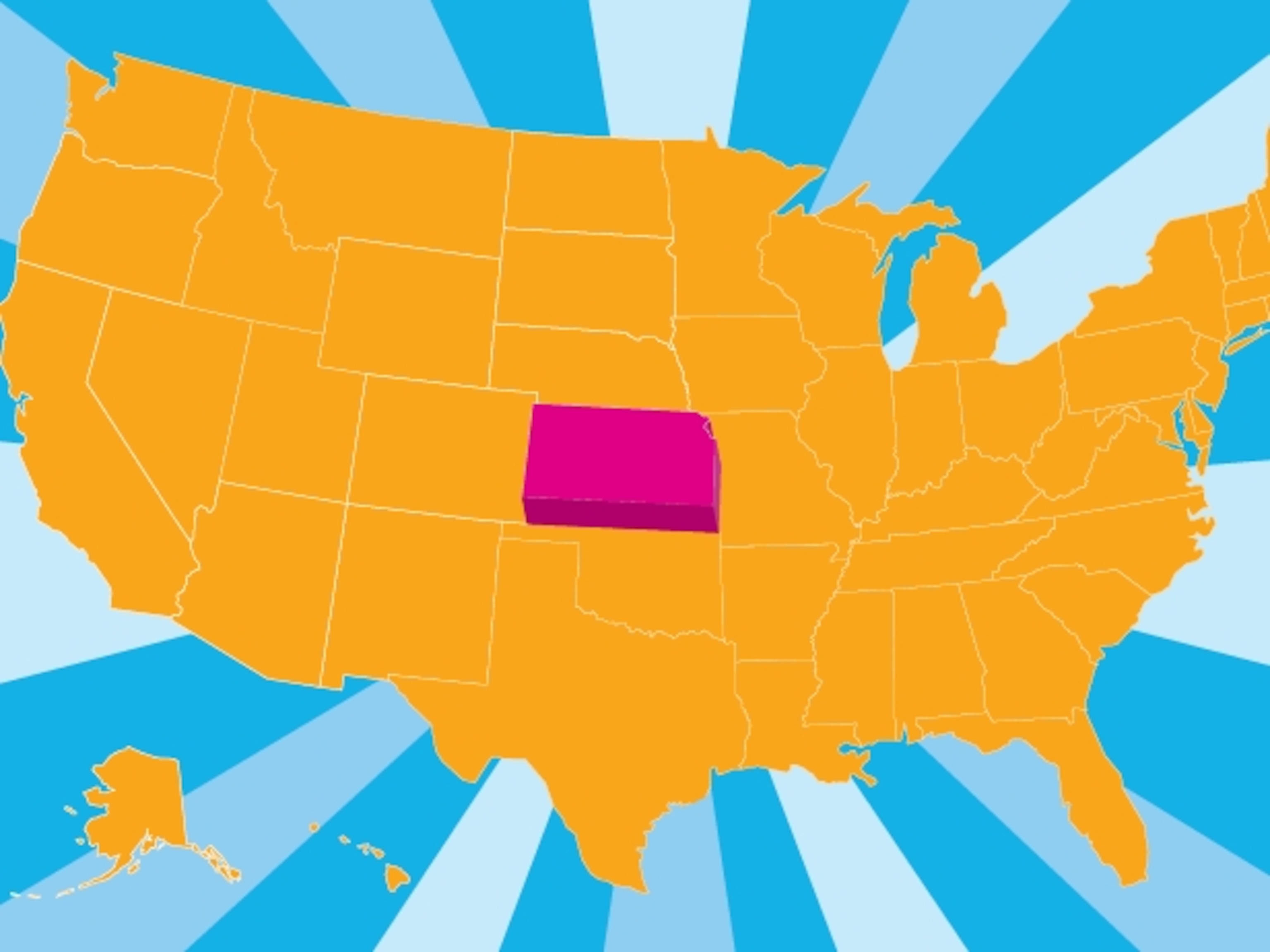How Kansas Get Its Name
In this article, you will embark on a journey through time to uncover the fascinating story behind how Kansas get its name, examining the various influences and critical events that led to its present-day appellation.
Author:Mia ThompsonReviewer:Calvin PenwellNov 17, 2023109.8K Shares1.5M Views

The "Kansas" name originates from the Native American Kaws or Kansa people, who are a Sioux group—all State Name Origins. The Siouan aca "Southwind" is where the Kaw tribe got their name, according to the Kansas Historical Society. "Kanza" or "Kansa" was one of the several versions of the name given by French merchants and other Europeans.
The "People of the Southwind" constituted the majority tribe in the future state to which they gave their name by the middle of the eighteenth century." In this article, you will embark on a journey through time to uncover the fascinating story behind how Kansas get its name, examining the various influences and critical events that led to its present-day appellation.
How Did Kansas Become A State?
Before Kansas became a state, it was home to a large population. This was the home of American Indians for a very long period. Explorers from Spain and France passed through Indian territory. They declared the region to be their own and wrote about what they had seen.
In those early days of the United States, there was a widespread belief that additional land was necessary.
The desire of many was for the US to go westward. President Thomas Jefferson of the United States purchased a sizable tract of property from the French. This region, known as the "Louisiana Territory," included Kansas. Americans soon wanted to divide the Louisiana Territory's territory into states. In this way, Kansas rose to become the 34th state in the union.
How Kansas Get Its Name - History
The 19th century marked a period of westward expansion and exploration in the United States. As American pioneers and settlers moved westward, they brought with them a range of names and traditions. In 1827, the U.S. government established the "Territory of Arkansas," which included the land that would later become Kansas. The name "Arkansas" was borrowed from the native Quapaw people and anglicized from the Algonquian word "Akansa," meaning "downstream people."
However, the geography of the region was far more diverse than a single territory could encompass, and soon, it became evident that separate territories were needed. The question of what to name these new territories arose, and it was crucial to choose names that resonated with the distinctive characteristics and heritage of each region.
Are Kansas & Arkansas The Same?
Although Kansas and Arkansas are close to one another on a map, their names don't have anything to do with one another. Despite having the same last two letters, Kansas is pronounced as "KANzis" and Arkansas as "Arkansaw."
Kansas
The Kansa, a Siouan tribe that inhabited the area, inspired the name Kansas. The state of Kansas was named after the Kansa people, who were referred to as Kansas in the plural. However, before it did, speakers of other Native American languages, as well as those of English, French, and Spanish, came up with their methods of spelling and pronouncing the tribe's name.
The Kansa people spoke it as roughly "kauzeh," using a nasalized "a" (instead of a whole "n"), a "z," and an "eh" sound. There were variations among the others, and historical documents document a variety of spellings, including Kansa, Kansas, Kantha, Kances, Konza, Kauzas, Canees, and Canceys. In the end, Kansas prevailed.
Arkansas
The Quapaw, a kindred Siouan tribe, inspired the name Arkansas. The Algonquians combined the Kansa moniker (derived from the same root as Kansas) with their A-prefix, which they used in front of other ethnic groups to refer to them as "Akansa." Others adopted the Quapaw's name from the Algonquians, which they also spelled differently: Akancea, Acansea, and Acansa.
However, the French translation, Arkansas, served as the model for the final state name. The last plural s is silent in French. After the Louisiana Purchase, English speakers adopted a modified French spelling and pronunciation, with an S on the page but not on the tongue. This decision was made for unknown reasons.
Origin Of Kansas And Arkansas
In actuality, the names of these two states are derived from two distinct Native American tribe languages. Arkansas, a state in the Southeast of the United States, gets its name from the Quapaw tribe. The Algonquin people were the ones who initially told the French explorers about the presence of the Quapaws in this region, and they called the tribe the Akansa. Conversely, the name Kansas comes from the Kansa tribe that used to live in this part of the Midwest.
However, this still needs to explain the variation in pronunciation. Some of the guilt lies with the French settlers and explorers. The tribe who lived in the area when Europeans first arrived gave their colony the name Arkansas, which is the plural version of the tribe's name in French. In French nouns, the last "s" is often silent. And that clarifies which Arkansas is pronounced that way. The tribe and its hamlet were referred to by the indigenous term Arkansa by the French. They referred to the tribe's people and the Arkansas River by the plural name, Arkansas.
The Sunflower State - Kansas' State Nickname
Kansas is often referred to as the "Sunflower State." This moniker reflects the state's abundant wild sunflowers that bloom across its vast prairies, especially during the late summer and early autumn. The sunflower, a bright and cheerful plant, has become an enduring symbol of Kansas, and its association with the state is celebrated in various ways.
Kansas' nickname as the "Sunflower State" was officially adopted on April 5, 1903, when the Kansas state legislature passed a resolution declaring the sunflower as the state flower and Kansas as the "Sunflower State." This decision was rooted in the state's natural beauty and agricultural significance, and it further contributed to the state's unique identity and charm.
A Mosaic Of Influences - The Complexity Of Language
The naming of Kansas exemplifies the rich tapestry of linguistic influences that shape the toponyms of American states. Names often undergo significant transformations as they travel through different cultures and languages. The journey from "Kansa" to "Kansas" is just one of many examples of how words evolve and adapt to their new environments.
The transformation from "Kansa" to "Kansas" can be attributed to the natural evolution of language, as well as the influence of English phonetics. As the French name "Cansez" was anglicized, it evolved into "Kanza." Over time, the pronunciation of "Kanza" in English led to the present-day "Kansas." Moreover, the addition of the "-s" at the end is consistent with the conventions of English place names. Many American states, such as Arkansas and Illinois, have names that end in "-s." This linguistic tendency contributed to the choice of "Kansas" over other potential variations.
About Kansas
Kansas, located in the central United States, has a diverse cultural landscape that reflects its history, geography, and the people who have settled there over the years. Here are some critical aspects of Kansas culture:
- Agriculture- Agriculture has been a fundamental part of Kansas culture since its settlement in the 19th century. The state is known as the "Wheat State" and "Breadbasket of the World" because of its significant production of wheat, corn, soybeans, and other crops. Farming traditions and rural values continue to play a crucial role in the state's culture.
- Native American Heritage- Before European settlement, the region that is now various Native American tribes, including the Kansa, Osage, Pawnee, and Wichita, inhabited Kansas. Native American heritage and culture are still an integral part of Kansas, with several tribes maintaining a presence in the state.
- Cowboy and Ranching Culture - Kansas has a rich cowboy and ranching heritage, particularly in the western part of the state. The cattle industry and cowboy traditions have left a lasting impact on the culture, including rodeos, Western art, and cowboy cuisine.
- Historic Sites- Kansas played a significant role in the westward expansion and the Civil War. It is home to many historic sites, including the Santa Fe Trail, Fort Larned, and the Brown v. Board of Education National Historic Site in Topeka. These sites reflect the state's history and culture.
- Arts and Music- Kansas has a vibrant arts and music scene. The state is known for its folk and country music, with artists like Woody Guthrie and Bob Dylan having ties to the state. Additionally, there are numerous local art galleries, theaters, and music festivals that showcase a wide range of cultural expressions.
- Sports- Sports are a big part of Kansas culture, with college basketball, in particular, holding a special place in the hearts of many Kansans. The University of Kansas and Kansas State University have successful basketball programs that draw passionate fans. Additionally, outdoor activities like hunting, fishing, and hiking are popular in the state.
- Diverse Population- Kansas has a diverse population of people from various ethnic backgrounds, including European, African American, Hispanic, and Asian communities. This diversity contributes to a rich tapestry of cultural traditions and events throughout the state.
- Food- Kansas cuisine often reflects its agricultural roots, with dishes featuring locally grown ingredients. Barbecue is a popular food tradition in the state, and you'll find a variety of regional styles and flavors. Other notable foods include Kansas City-style barbecue, chili, and comfort foods like chicken-fried steak and mashed potatoes.
- Festivals and Events- Kansas hosts a wide range of festivals and events throughout the year, celebrating everything from agriculture and music to arts and heritage. The Kansas State Fair, held annually in Hutchinson, is one of the largest and most popular events in the state.
- Hospitality and Friendliness- Kansans are often known for their hospitality and friendliness. Visitors to the state often remark on the warm and welcoming nature of the people they encounter.
Overall, Kansas culture is a blend of rural and urban influences, with a strong connection to the land and a rich history that continues to shape its identity.
How Kansas Get Its Name - FAQs
Why Is Kansas Known As The "Sunflower State"?
Kansas is known as the "Sunflower State" because of its abundant wild sunflowers that bloom across its vast prairies, especially during late summer and early autumn. The sunflower, a bright and cheerful plant, became a symbol of the state's natural beauty and agricultural significance.
What Significance Does The Name "Kansas" Hold For The State's Identity?
The name "Kansas" holds historical and cultural significance for the state, as it is a tribute to the indigenous Kansa people and the French explorers who first ventured into the region.
Are There Other American States With Names Influenced By Indigenous Peoples?
Yes, many American states have names influenced by indigenous peoples. For example, "Arkansas" is derived from the Quapaw people, "Connecticut" from the Algonquian word "Quinnehtukqut," and "Idaho" is a coined name with unclear origins.
How Has The Name "Kansas" Influenced The State's Culture And Heritage?
The name "Kansas" is deeply ingrained in the state's culture and heritage. It connects the state to its indigenous roots and the history of westward expansion.
Conclusion
The article aims to explain how Kansas get its name. The name "Kansas" is a product of a complex historical narrative that traverses indigenous cultures, French explorations, westward expansion, and linguistic evolution. It exemplifies how the toponyms of American states often carry with them the echoes of the past and the amalgamation of diverse influences. Kansas' name is a tribute to the Kansa people, who inhabited the region long before it became a state, and to the French explorers who ventured into the American interior.

Mia Thompson
Author
Mia Thompson is a versatile writer at Kansas Press, delving into a range of topics including news, spiritual exploration, astrology, and numerology. With a passion for delivering insightful and informative content, Mia's articles provide readers with valuable perspectives and thought-provoking insights into these intriguing subjects.
She is dedicated to creating content that resonates with readers and fosters a deeper understanding of complex topics.

Calvin Penwell
Reviewer
Since diving into numerology in 1997, my path has been marked by extraordinary encounters and insights. A pivotal moment was uncovering a forgotten numerological manuscript in a tucked-away Italian library, which deepened my connection to the ancient wisdom of numbers. Another transformative experience was a meditation retreat in Nepal's tranquil mountains, where I honed my intuition and the art of interpreting numerical vibrations.
These adventures have not only enriched my numerological practice but also my ability to guide others towards understanding their destiny and life's purpose. My approach is deeply personal, rooted in a blend of historical knowledge and intuitive insight, aimed at helping individuals find their alignment with the universe's abundant energies. My mission is simple: to share the power of numerology in illuminating paths to abundance and fulfillment.
Latest Articles
Popular Articles

